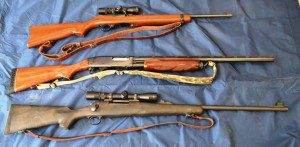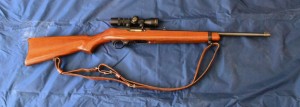by Leon Pantenburg
For me, owning firearms was never a consideration. I come from a long line of hunters and shooters, and some of our firearms have been passed down for generations. I grew up on an Iowa farm, and all my peers hunted. Some of my first memories include my dad teaching me gun safety and how to shoot. The first item I saved up to buy was a Ruger 10/22 rifle.
 |
| The C.T. Fischer four-inch Bushcraft is a great choice for an all-around, everyday carry knife. Check it out! |
 |
| The Ruger 10/22 (top), Remington 870 pump action shotgun and Remington 700 bolt action rifle are good choices for the beginner. (Leon Pantenburg photo) |
In my Dad's locked gun cabinet were firearms of many configurations, ranging from pistols to shotguns. Dad, a World War II infantryman, had an M1 Carbine, and a couple loaded clips. That was the weapon he reached for when things went bump in the night on the farm. I never occurred to me to use that M1 "assault rifle" with the extended clips to do harm to anyone.
But suppose you have no firearms background whatsoever, and are considering buying one. Let's say you are concerned about self defense, and want to be able to protect yourself and your family during a potential disaster or emergency. As a side benefit, you may want to eventually get into hunting, or think it might be a good idea to learn how to shoot accurately.
Buying a firearm is not something to take lightly. Here are some of my opinions, based on experience, that will hopefully impact your decision process.
- I support the National Rifle Association and believe in the Second Amendment right to bear arms. But I don't think everyone should own a firearm! Anyone unwilling to invest the necessary time to become proficient with a firearm, could become a danger to himself or others. If you are mentally unstable, a convicted felon or otherwise impaired from the responsible use of a firearm, you should not have one.
- Before you buy any firearm, take a gun and/or hunter safety course or a concealed weapons class, even if you don't intend to carry concealed. There are many educational opportunities available, and contacting the sheriff or local Fish and Game Department is a good way to locate a class. Have a safe, secure place to store the firearm and ammunition before you go shopping.
- Why are you buying a gun? Self defense? Hunting? Recreation? Target shooting? Learn the differences between firearms - a .38 caliber snubbie for self defence will not work very well for deer hunting. And that scoped, bolt action hunting rifle might not be the best choice to repel intruders inside your apartment.
Where will you secure the gun? Owning a gun that can't be stored safely is irresponsible, and in my mind, is a good reason NOT to have one.
A firearm is neither good nor evil. It is an unthinking machine until someone picks it up and decides how it will be used. Possessing a gun won't keep you safe. Like anything, you must develop the skills to use the weapon.
A semi-automatic weapon, with high capacity magazine, does not make the best self defense weapon. Large capacity magazines encourage a lot of "spray-and-pray" IMHO, and the only shots that count are the ones that hit the intended target.
Last year, I interviewed U. S. Marine Kyle Thompson of La Pine, OR. Thompson had just come back from deployments in Iraq and Afghanistan, where he had served on Recon teams. The Marines, all of whom were sniper school graduates, were frequently dropped in Taliban territory to track down terrorist bands and help defend isolated villages.
With any weapon at their disposal, Thompson said the Marines frequently relied on the bolt action, .308-caliber M-24 scoped sniper rifle. The Taliban were armed with
 |
| My bolt action Remington 700 in 7 mm magnum caliber is my favorite elk hunting rifle. It is not the best choice for an overall self defense weapon. |
fully-automatic AK-47s. A common ambush situation, Thompson said, was that a Taliban terrorist would open up on a patrol and empty a 30-round clip in a continuous burst. The Marines could stay out of AK range and respond with a M-24. Results were predictable.
Probably the most important self-defense question is this: Are you willing to kill someone to keep yourself or loved ones safe? This question needs to be answered honestly before you go any further on the self-defense firearms purchasing path.
In his book On Killing Lt. Col. Dave Grossman argues that many people could not kill someone, even when threatened with lethal force. Killing from a distance, Grossman writes, such as artillery or bombing, can be relatively easy. But a close encounter, where you can see the other person and witness the affects of pulling the trigger, he comments, can be extremely difficult for most people.
Brigadier General S.L.A Marshall discovered this in surveys of combat military personnel.
"In World War II, only 15 to 20 percent of combat infantry were willing to fire their rifles. In Korea, about 50 percent," Marshall writes. "In Vietnam, that figure rose to more than 90 percent."
If trained military people have problems pulling a trigger during combat, what will your chances be? Your unwillingness or inability to use your gun under dire circumstances could cause you to be disarmed. Then you have armed a perpetrator.
If your mind in not made up on these points, don't buy a gun. It will do you no good, and may cause harm.
Check out this video regarding extended clips.



